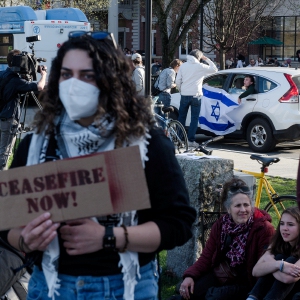Column: Two new rays of light on the abortion war
| Published: 02-13-2023 10:54 AM |
Now that anti-abortion activists have marked the 50th anniversary of the Roe decision by celebrating its overthrow in their annual “March for Life,” both sides in the long-running abortion war are poised for more battles.
According to the Pew Research Center, 61% of Americans believe that abortion should be legal in all or most cases. In the seven months since the Supreme Court ruled that states are allowed to ban it, 24 states have done so, but courts have blocked some of these bans, and Michigan has voted to amend its constitution so as to protect abortion rights. In other words, the fog of this war has if anything grown thicker.
A major source of fog is the very phrase “pro-life.” The overwhelming majority of those who call themselves “pro-life” do nothing to enhance the lives of women, pregnant or otherwise, the lives of babies, or even the lives of fetuses. Though 1 in 5 abortions spring from the woman’s fear that she cannot afford to have a child, most “pro-lifers” do nothing for such women. They do not endorse public funding for prenatal care, deliveries or postnatal care, which can sometimes be ruinously expensive even for those with good health insurance.
Why don’t most “pro-lifers” support public funding for any of the costs of child-bearing? Here’s the dirty little reason: While all such care costs money, sometimes big money, criminalizing abortion in the name of “life” puts all the costs of childbearing on women and/or their partners, regardless of their ability to pay. Governments pay nothing.
Where then is the ray of light on this problem? It comes from Eric Scheidler, executive director of the Pro-Life Action League, who wants to solve it. Just two weeks ago, he and three of his allies issued a statement “on building a post-Roe future”: expanded child tax credits, paid parental leave, child care options and “expanded Medicaid funding for prenatal care, delivery and postpartum expenses” (Ruth Graham, “Will We Keep Marching?” New York Times, Jan. 19). Among those who call themselves “pro-life” Scheidler and his allies are clearly in the minority, but in setting out to actually improve the lives of women and their families, he is earning the right to call himself “pro-life.”
Within days of Scheidler’s statement, another ray of light was indirectly cast across laws banning abortion — by the highest authority in the Roman Catholic church. Just a week ago, Pope Francis plainly drew the line between sin and crime. Even though the Catholic church considers homosexual behavior sinful, the Pope stated that “being homosexual isn’t a crime,” and also that it is ”unjust” to criminalize homosexuality (Nicole Winfield, “Pope Says Homosexuality not a Crime,” Associated Press, Jan. 25).
In making this statement, the Pope was not just flaunting the kind of progressivism that has long alarmed the ultra-conservative watchdogs of Catholic doctrine. He was echoing the words of two of Christianity’s greatest saints: Augustine and Thomas Aquinas.
Though Aquinas thought prostitution mortally sinful, he also thought it should be legally tolerated. “In human government,” he wrote, “those who are in authority rightly tolerate certain evils, lest certain goods be lost, or certain evils be incurred: Thus Augustine says (De Ordine 2:4): ‘If you do away with harlots, the world will be convulsed with lust.’ ” (Summa Theologica, 2-2.10.11). Whether or not he would advocate legalizing prostitution now, Aquinas cites Augustine to confirm the fundamental difference between sin and crime. Since human law aims not to save souls but to ensure temporal order, it cannot — says Aquinas — “forbid all vicious acts” (Summa Theologica, 1-2.96.3).
Article continues after...
Yesterday's Most Read Articles
 Dartmouth moves swiftly to stymie demonstration, leads to 90 arrests
Dartmouth moves swiftly to stymie demonstration, leads to 90 arrests
 Dartmouth graduate student-workers go on strike
Dartmouth graduate student-workers go on strike
 At Dartmouth, hundreds protest ongoing war in Gaza and express support for academic freedom
At Dartmouth, hundreds protest ongoing war in Gaza and express support for academic freedom
 Art Notes: City Center Ballet celebrates 25 years
Art Notes: City Center Ballet celebrates 25 years
Aquinas thus explains how the criminalization of sin can disrupt “temporal order.” Almost 800 years ago, he foresaw the chaos that has been spawned by the Court’s erasure of the line between sin and crime.
It is hardly a coincidence that five of the six Supreme Court justices who voted to overturn Dobbs are Roman Catholic. In ruling that states may criminalize what Catholicism considers a sin, they were doing precisely what Augustine, Aquinas, and now the Pope himself has rejected. Like those Catholic justices, the archbishop of San Francisco has denied communion to Nancy Pelosi simply because she does not believe in criminalizing abortion. But the Pope has blessed both Pelosi and President Joe Biden because he knows that both are devout Catholics who fully understand the difference between sin and crime.
Call me benighted if you wish. But in the statements just made by the Pope and one leading “pro-lifer,” I see two rays of light.
James Heffernan, of Hanover, is a professor of English emeritus at Dartmouth College. www.jamesheff.com.

 Editorial: Chris Sununu’s moral vacuum
Editorial: Chris Sununu’s moral vacuum Editorial: Gambling tarnishes America’s sporting life
Editorial: Gambling tarnishes America’s sporting life By the Way: A white nationalist’s many mistruths
By the Way: A white nationalist’s many mistruths Column: The age-old question of what to read
Column: The age-old question of what to read
